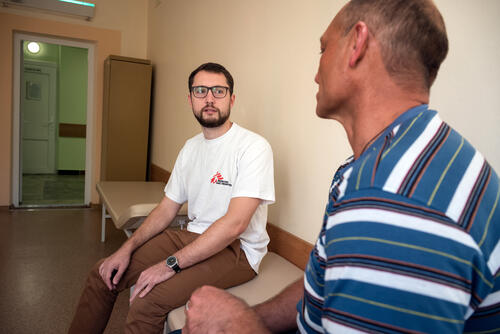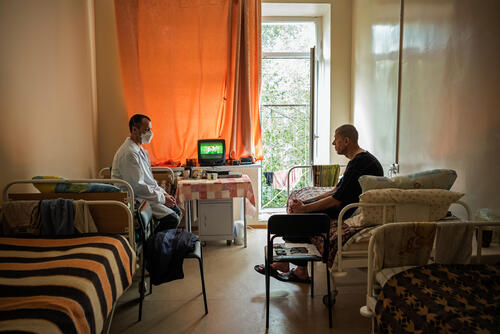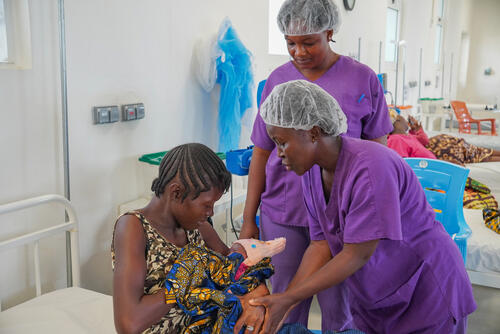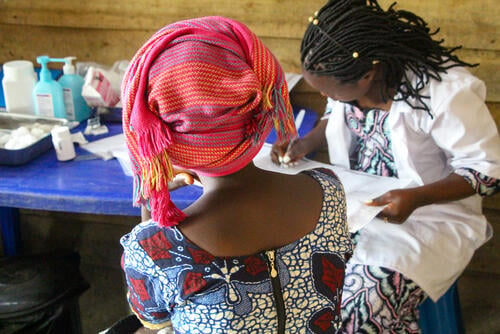In Belarus, patients under treatment for drug-resistant tuberculosis (DR-TB) are being helped to manage alcohol and other substances in order to finish their treatment successfully, with the help of a programme which includes psychosocial support – or the psychological and social needs of people – devised by Médecins Sans Frontières (MSF).
MSF mental health activity manager Christian Falkenstein says the first results of the programme are very encouraging.
“Since we implemented structured psychosocial support, we have observed a higher adherence to treatment in our patient group,” says Christian. “After the pilot phase, we started systematically collecting evidence. We are happy to report that we have been able to maintain our target adherence rate of 85 per cent, which means that patients miss less than 15 per cent of their TB medication.”
Support includes health education, individual and group counselling, as well as support in everyday life situations.Christian Falkenstein, MSF mental health activity manager
Supporting people facing difficult treatment
With DR-TB, both the illness and the treatment can have a serious effect on patients’ mental wellbeing. For patients with other conditions – such as harmful alcohol or drug use, which is especially common amongst patients who have gone through TB treatment before – it can be doubly difficult to keep going until the end of the treatment.
MSF’s psychosocial team, working with colleagues from the Ministry of Health of Belarus, devised the adherence support programme in order to support patients who have issues with using alcohol or other substances, and to help them maintain the resolve and resilience needed to tackle the disease.
“Besides detoxification and anti-craving medication, we use a people-centred approach that prioritises patients’ needs,” Christian said. “Patients are put at the centre of care and are involved in decisions about their treatment.”
“In practice, this means that MSF counsellors team up with everyone involved – including doctors, nurses, social workers and family members – to create a support system for the patient,” Christian continued. “The support includes health education, individual and group counselling, as well as support in everyday life situations. We also plan to involve civil society and self-help groups.”

DR-TB a difficult diagnosis and treatment to cope with
Patients who need psychosocial support to help them stick to their treatment are identified early on and receive support from day one of their DR-TB treatment.
Treating DR-TB is a long and arduous process. For some people, the diagnosis itself can be hard to deal with, especially in communities where the disease is stigmatised and seen as a source of shame.
The need to stay in hospital for weeks or even months at a time, taking daily doses of antibiotics, soon begins to take its toll. For many patients, their resolve to finish the treatment wanes under the burden of the sheer amount of medication they have to take, as well as the inevitable side effects, which include constant nausea, aching limbs, deafness and sometimes even psychosis. Patients with alcohol or drug problems are often tempted to turn to a familiar solution – unless they have a strong support system in place.
“Being diagnosed with TB can make one isolated,” says Christian. “For many patients, their coping mechanisms to deal with the resulting negative emotions is to use alcohol or other substances. If they are intoxicated, patients are prone to miss taking their TB medication. That’s why psychosocial support and harm reduction are essential to help patients find alternative ways to deal with stress, manage their alcohol use and make healthier lifestyle choices.”
While continuously fine-tuning our support programme, our team plans to conduct a study to demonstrate its feasibility and evaluate its effectiveness. If proven successful, we hope that TB programmes in other countries will take it up, so that people-centred care and psychosocial support become widely available and benefit many more patients on treatment for DR-TB.
MSF has worked in Belarus since 2015 providing targeted support in the treatment of multidrug-resistant tuberculosis (MDR-TB) and extensively drug-resistant tuberculosis (XDR-TB) for patients with alcohol addiction and patients from marginalised groups. MSF provides the latest-generation TB drugs and psychosocial support to help patients adhere to their treatment.






